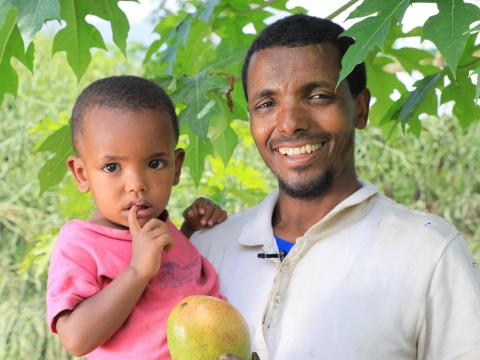Non-complacent until no child goes to bed hungry

This year’s World Food Day theme: "Our actions are our future – Better production, better nutrition, a better environment and a better life" is a bold reminder of the key responsibility that lies with all of us as we continue to lead our ongoing multifaceted development interventions to build a brighter future for vulnerable children. World Vision is determined to make a difference through its work in Ethiopia, where food insecurity is highly aggravated by recurrent drought, inter-communal conflict, desert locust invasions and COVID-19.
Ethiopia has made major strides in improving nutrition over the past two decades, where the prevalence of stunting decreased considerably from 58% in 2000 to 38% in 2016 and further to 37% in 2018 (Ethiopia Demographic and Health Survey, 2019). However, food insecurity and hunger levels remain serious and alarming in several areas. Within such a scenario, children are often the ones that pay the heaviest price.
With a vision for a hunger-free world for the world’s most vulnerable children, families and communities; and with a promise to leave no one behind, World Vision is providing assistance to disaster-affected people to save lives, improve health and education, and empower vulnerable communities to become self-reliant.
Through its USAID-funded SPIR* project, World Vision helps households in the PSNP4** programme to achieve food security at household level through a combination of savings, diversifying their sources of income by creating opportunities for income-generating activities and skills training that can help them graduate from food assistance.
The SPIR health and nutrition package also includes integrated nutrition Behaviour Change Communication (BCC), water, sanitation, and hygiene (WASH) activities as well as food demonstrations that are open to all members of the community.
Natural resource management for improved productivity and livelihoods
Although Ethiopia’s economy is diversifying, subsistence and rain-fed farming is still the main source of income for majority of the population. With 80-85% of Ethiopians engaged in agriculture, land degradation driven by lack of proper land management and agronomic practices continues to ravage in Ethiopia.
The SPIR project uses a natural resource management approach for improved and sustainable productivity in the most affected areas. This with an aim to revitalise the natural resources base and restore ecosystem service through context-specific interventions for improved productivity and resilient and diversified livelihoods. This approach uses simple and easily replicable techniques that support sustainable land restoration to combat desertification and natural resource degradation.
Miheret Demissie, a 68-year-old, farmer had previously used his 0.25 hectare of plot to get an average yield of 150 kg (wheat or barley) every year for the last 30 years. With World Vision’s capacity-building support, he gets about 400 kg of cereals, and produces about 400 kg of potato, 200 kg of onion, and 50kg of garlic each year. Today, he also has more than 30 different fruit trees.

“I have been farming for more than 30 years and have never seen anything like this, had never been able to feed my family let alone getting cash income”, says Miheret. “My harvest drastically increased and diversified. Now, we are cultivating all year round with modern practices taught by World Vision and its partners' staff. Most of the practices are new and helping me get additional income. My life is on the right track at the end”.
World Vision, together with its partners and donors, has been rising to the occasion to address the hunger challenge for decades; sowing the seeds of resilience and hope. We will not be complacent, and our actions will not stop until no child goes to bed hungry –because having one child struggling with hunger is one too many.
---
*Strengthening PSNP4 Institutions and Resilience (SPIR)
**Productive Safety Net Program 4 (PSNP4)